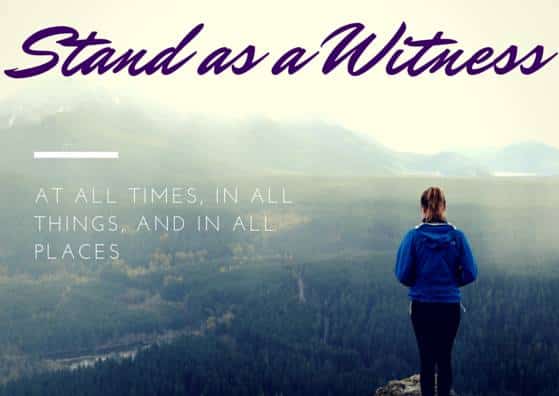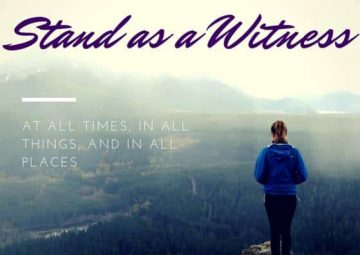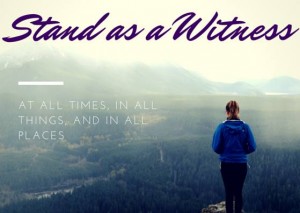My oldest son turned eight at the end of 2014 and was baptized by my husband. My husband is a wonderful man and I had no issue with him performing the baptism. I did however, notice several major discrepancies between our participation that day, even though we have both been equally invested in raising and caring for our son in every other way.
I had planned to ask my dad and my father in law to be the witnesses to the baptism, but forgot to ask them in advance. When it was time for my husband and son to enter the font, my bishop asked me who would be serving as witnesses, and I quickly motioned to the two of them to go up front on either side. Neither of these men knew anyone presiding at the baptism, and it occurred to me that I could have literally pulled any man off the street into the stake center that day to serve as a witness. I didn’t have to prove that they held the priesthood, were worthy, or even a member of the church. Checking that a child goes completely under water is not a priesthood ordinance. Why do the witnesses have to be men? What about me, his mother? If a woman was literally the first witness of the resurrection of Jesus Christ, I believe a woman could be allowed to witness at a baptism. Even that small participation on that day would have meant the world to me.
After the baptism, we went to another room for the confirmation. The empty chair awaiting my son was front and center, so I sat down directly in front of it, determined to be as close to him as possible during this important event. Unfortunately my bishop (non-maliciously) picked up that chair and moved it to the opposite side of the room right before the blessing. He was simply making more space for the men who would stand in the circle, but inadvertently excluded me by doing so. I was sitting with my two younger daughters and a small niece at that point, and there were no available chairs to move to anyway. I stayed where I had originally sat down, mildly disappointed.
Almost immediately after the blessing started, my five year old daughter started crying. She was trying to draw a Minecraft character that her brother liked on a card the primary presidency had passed out, but couldn’t make it look right. I tried to hush her and told her to wait until after the blessing was over. She became more upset, and begged me to draw it for her as I tried to quiet her down. Her cousin and little sister both started wiggling around at the same point, and my daughter was clearly on the verge of a hysterical meltdown right in the middle of the prayer. I whispered, “hand it to me and I’ll try to draw it”, and hoped that would calm her down. Instead she saw I was only holding her card and her frantic whispered voice became high pitched as she started to cry again, “I need you to draw a creeper for me for Benjamin!” I tried to draw a “creeper”. Unfortunately, I didn’t know what a creeper character even looks like, and as my daughter saw me pretending to draw a made up character, she became even more upset and cried, “You’re ruining my card for Benjamin, and that is not a good creeper!”
The next thing I knew, I heard my husband say “Amen”. I’d tried so hard to carefully make myself a part of that day, but I still missed almost all of the blessing my husband gave. I looked at the men who stood in the circle shaking my son’s hand, and realized my son didn’t even know the counselors in the bishopric, both who were up there. Men who my son had no connection to stood peacefully and heard every word of his blessing. As his mother, I sat in a chair across the room and tended to children, missing it almost completely. Over years of attending baptismal services, I’d seen other moms not hear their child’s confirmation and swore that would not happen to me too. But it did.
There has to be a better way. I don’t think loving Heavenly Parents want mothers to be on the sidelines on such an important day. Why did I, the woman who has spent every day of his life raising and teaching him, sit behind the throngs of children kneeling at the font, while the grandpas stood up front, directly above the ordinance? The day was about my son of course, not me. I didn’t bring this up to anyone, and I didn’t complain about it. That doesn’t mean I don’t hope policies will change to include mothers in more meaningful ways in the future. Based on this experience, I’m very happy to see the newest action announced by Ordain Women. I plan to send my story in with them, and continue to ask for change, and to make things better for when my daughters grow up.
Find out more about this latest action here, on the Ordain Women website:







18 Responses
In the days of Abraham a priest would stand by and witness the proxy transfer of the one repenting to the animal being sacrificed as well as witnesses were in place to observe the sacrifice itself. Perhaps this tradition is where the LDS tradition of having priesthood holders witness the baptism ordinance comes from. The symbol of laying down (sacrificing) an old life and coming forth into a new, clean, covenant life is the same as it was anciently. I’m not saying the tradition needs to continue, but I can see and understand where it may have come from.
Oh, my heart for you. I am sure your experience is not unique among Mormon mothers.
I will be right there in a couple of months with my own 8 year old. I’m planning on insisting on my presence and involvement. Making that institutional would be so easy and be so good for families. Do we value motherhood? Then let’s value mothers and include them!
The men in these scenarios can be challenged to recognize the problem because they literally do not see it–especially given that the very problem is how unseen women are in important spaces. Thank you for telling your story and helping make challenges like this visible.
When performing the first baptism for the Church of Jesus Christ in Christian Fellowship, I asked a few different men to be witnesses. Seeing that there are no other members of the Fellowship in Ohio, I asked two LDS men, as they are also Mormon Priesthood holders. One said no, but came with his family to show support. The other said yes, but then couldn’t come as everyone in his family fell ill. I didn’t know what to do.
Then, my wife asked me a question. “Where in the Scriptures does it say the witnesses must be men?” I could find nothing that said this, and enquired of the Lord. I felt the need for two witnesses, that were members of the Fellowship, or another Mormon denomination, but that was all the Spirit compelled me to require. Thus my wife, his mother, was the first witness and his older brother, age 9 was the second. It was a very Christ and family oriented baptism.
It was wonderful seeing my wife a part of this sacred ordinance with our son. I invited her to lay hands upon his head with me, for support as Joseph F. Smith had taught, but she did not feel comfortable doing this. I have to say that even though this son was baptized in a friend’s bathtub, I felt the spirit stronger than I did baptizing his two older siblings into the LDS church, as it was about our family and the Lord, not the LDS church with our kids as a side note. My wife was a part our our son’s spiritual journey, and not another guest sitting on the sidelines.
Dave, I love this story! Thank you so much for sharing it.
Thanks so much for sharing this, Elizabeth. Your experience sounds awful and frustrating. Thanks for highlighting how wrong it is.
Elizabeth, I’m so sad to hear this, and it does highlight the importance of such an easy change to make. I hope your next child’s experience getting baptized has you witnessing it.
Although I can see that you didn’t have a great time of it, I don’t think all the blame can be placed at the Lord’s feet for the doctrines and polices of His Church.
First, for each of my 7 children’s baptisms my wife has been at the steps leading in to the font and witnessed the baptism as close at hand as the witnesses.
Second, why on earth was a card being passed around at a baptismal service, especially at the time of the confirmation?
Third, since there were two grandfathers there, were there not also grandmothers? Could they not have helped with the younger children and allowed you to hear the confirmation blessing?
You see, whilst I understand that this is an attempt to say women should be involved, or even perform these ordinances. But who would have looked after the two younger children if Mom, Dad and all four grandparents had been in the circle? Who get’s left out.
Fourth, I think it is a safe assumption, though not one I have ever made presiding at a baptismal service, that the mother of the child asking his grandfathers to witness, would know they are priesthood holders. I would have had it sorted prior to the meeting start, and on the programme.
Just a note on this part;
But who would have looked after the two younger children if Mom, Dad and all four grandparents had been in the circle? Who get’s left out.
Under current policy, the women get left out. Every single time. That may not bother you, but it bothers many women, and it certainly says a lot about the status of women in our church.
But what if things were different? A baptism has one person who officiates the ordinance and 2 official witnesses. A confirmation has one officiator and any number of people in the blessing circle who can reasonably fit in the space. A child with two parents and four grandparents participating in these ordinances could have three of these people involved in the three baptismal roles, and whoever sat our with the younger children during the baptism could participate in the confirmation that follows next while a different person sat out with the younger children for that part. All of the adults who love this child most could participate in this special day.
Agreed, but one would still have missed the words due to unruly children and an inappropriate card being passed around (not that the card itself was inappropriate, I hope you get what I mean).
I realise I am a man, and I hold the priesthood, and I got to bless, baptise and confirm 7 children – and I feel privileged and grateful for having been able to. But I really have great difficulty in understanding why this is such a BIG deal. I can understand that it would be nice to hold a baby, witness a baptism, etc. I don’t fully agree that all of those things could be done by a non-priesthood holder (and I am going to leave the issue of female ordination to the side for this). Aaronic priesthood men can not hold their baby either, or be in the confirmation circle.
It is obvious from my comments on this site that I believe entirely in male/female roles in an eternal sense. I know men can clean, cook and sew (I can do, and do do, all three) and that women can do many things that were traditionally male roles. I also know that some single parents have to be both parents. But from a trying to become gods together point of view I see both the male and female roles as eternal. So my wife (and two of my six daughters) have given birth (or at least had a c-section). They have carried a child, literally given it life, spent the majority of the early learning time with them. I, and my grandchildren’s fathers, have not. We have done what we could around employment. But Mum has had that (from a male perspective) privilege. I will never be pregnant, nor give birth, or breast feed a child. I can not give of my body to a child in the way a mother can. So I get to use my God given thing (the priesthood) to perform these ordinances. If that has to be enough for me, why is what women get to do in this Plan of Happiness not enough?
I our Heavenly Parents want us to have the happiness they have I believe they would give us the best way to achieve it. I suspect that Heavenly Mother may think some women want their cake, and to be able to eat it.
I’m late replying to this, but I can explain the card.
In my stake, many children are baptized together on the same day. Each ward takes a turn going to the baptismal font, then moves to another room in the building for the confirmation blessings, because we need to give the font to the next ward in line.
While we are waiting for the kids to join us in that different room, the primary presidency passes around cards for everyone to write on for the kids that were baptized that day. They then collect them and put them in a book for the child to remember the day with. A lot of times there is a long wait while the kids change and get their hair dried, and we are sitting there for 15-20 minutes, and it is a good time to have the kids (and everyone else) preoccupied by writing or drawing on a card for the children being baptized.
This day, my son was the only one from my ward getting baptized, and he dried off and changed clothes within minutes, and didn’t need his hair blow dried. No one had finished their cards when they came into the second room, and while most people put them aside, it’s very hard to explain to a small child why she has to stop drawing during the blessing. In fact, it seemed like a good idea to let her keep drawing on her lap, because it was a quiet activity and I didn’t think it would interrupt anyone, especially me.
Yes, grandmothers were there. But the way things worked out, they were all sitting on different rows, and nobody offered to take the kids from me. The disruption didn’t start until the prayer had begun anyway, and if you have your own kids – you know how unpredictable children are. I honestly thought they were fine and didn’t ask anyone to help me with them. And during the prayer when she started getting upset and the other one started getting restless, I didn’t feel I could ask someone else who had their head bowed to take them out into the hall for me. I was stuck.
That’s how it happened.
Andrew R., I’ll never be pregnant or give birth, either. A lot of women are like me, infertile, unmarried or chose to not have children. We also don’t have priesthood. Giving birth is a mortal, physical attribute whereas priesthood is an eternal, spiritual attribute. Surely you can comprehend your apples and oranges argument is overly simplified and unkindly narrow minded.
I believe you will find I specifically took female ordination out of my comment. The norm is what we are talking about. The vast majority of women, especially in the church, have children themselves. Of course there will be those who can not. But for them, if they adopt then they are still generally the one spending the most time with the child in the formative years.
If you never have children then whether you can witness the baptism or not is moot.
The point is not moot. There are thousands of sister missionaries who could do well to witness the baptism of the converts they have taught, just as the male missionaries often baptize the coverts they have taught, even though they are not the parents of those being baptized. I understand that this post is from a mother’s perspective, but mothers are also women, who might also be returned missionaries.
Andrew R- so women shouldn’t be put in a place of honor (I always feel like witnesses have a sort of honor up there in front) on special days because they do all the day-to-day mundane things all the other days? That’s not how I’d honor motherhood…
Also, Spunky is totally right that witnessing is not just a parent thing. You could witness a sibling’s or cousin’s baptism. You could witness a friend’s or spouse’s or niece or nephew’s. You could witness a neighbor’s or coworker’s.
I have never felt honoured at being asked to witness a baptism. I admit if my daughters had not wanted me to witness their sealings I would have been upset.
As I said for each of my 7 children’s baptism my wife was there to help them out of the water. She was closer to them than anyone else, including the witnesses. She was in her honoured place – mother. I don’t think being the official witness would have made any difference to her – but she doesn’t want to hold the priesthood either, so maybe she is different.
I don’t know what witnesses have to be priesthood holders, or why recorders in the temple baptisms and confirmation do either (given that sister record the WAC ordinances they perform) and the office staff recording them all to computer are often sisters. But I am happy to accept that if the Lord wanted it any other way He would make his will known. After all He made a lot of fuss when the Saints were not building a temple fast enough.
Alternately, if we don’t ask the question, are we ever going to get an answer? We wouldn’t have the Primary, the youth organizations, or the Word of Wisdom if faithful women (and men) hadn’t asked the church leaders to consider those things. Suggesting that things are the way they are because the Lord would change it otherwise removes our agency (and the agency of our leaders) entirely. God didn’t write Handbook 1 or 2 – mortals did. So it is well within our stewardship and duty to try to make this church better and more aligned with Christ’s teachings. Some of these policies might not be the will of God, but instead are the vain traditions of our fathers. To suggest that anybody questioning the way things are done is unrighteous or unfaithful is rather presumptuous and feels shaming to me.
I have no problem with men being the witnesses and priesthood holder. I don’t have a problem asking these questions. I don’t want the priesthood and have been happy with all of my children’s ordinances. But Andrew, your wife had 6 daughters out of 7 children and was able to sit on the steps with a towel for them to go into the women’s locker room. For your son she would not have been waiting on the step. But I like the idea for the mom to sit on the steps inside regardless. I find that what I find low tier problems like holding the priesthood, others find it high tier. I am assertive and when my husband was blessing our son and the microphone was out, I just got up during prayer and moved closer. I agree with you Andrew that bearing and being more with my children is more fulfilling to me than the thought of the Priesthood. Having been infertile for 8 years before having children, I can say as an LDS woman it is no comfort to designate Having Children as the whole purpose of our lives, if we can’t do it. LOVE! RESPECT! HONEST QUESTIONS! I rarely contribute to these discussions but everyone has been so civil and honest. I felt safe!